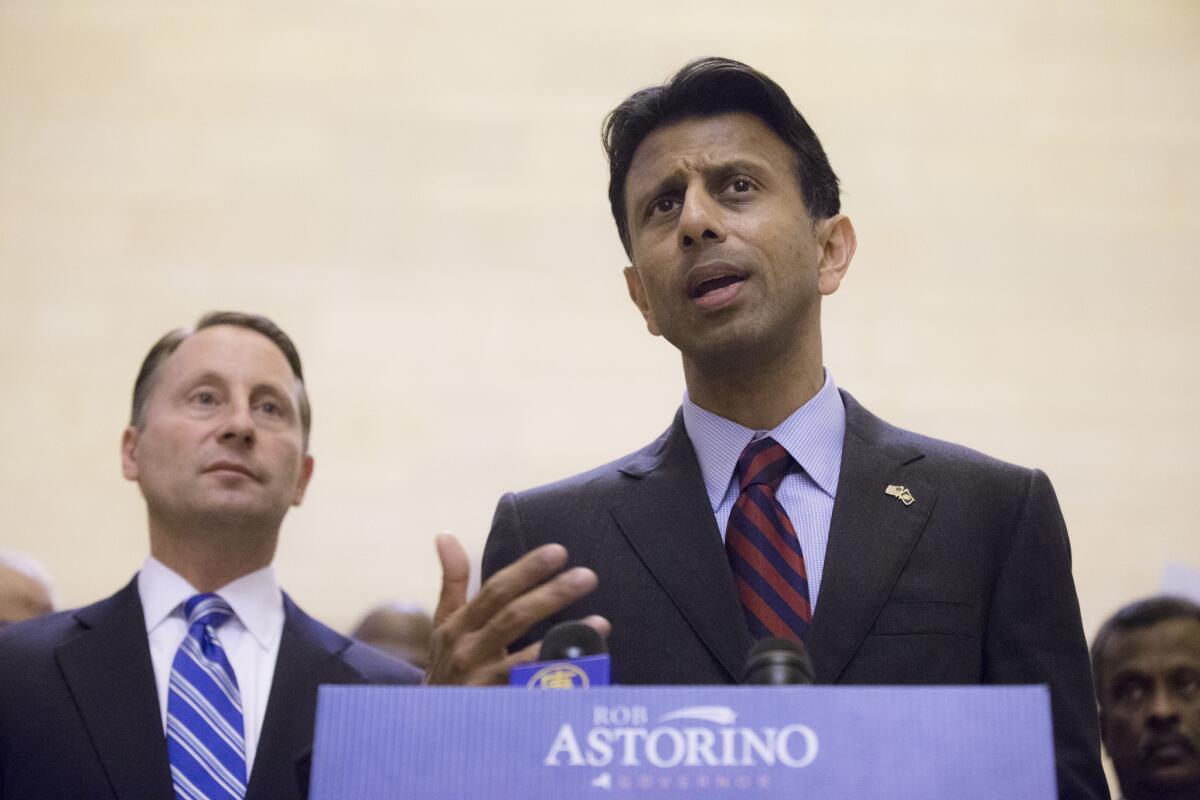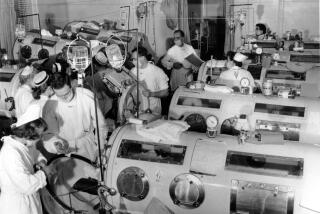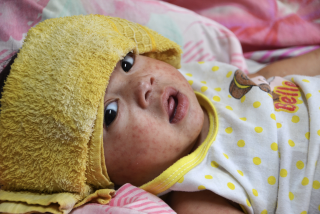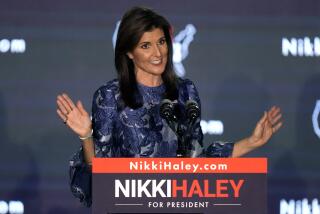To Govs. Jindal, Perry: A travel ban won’t save lives, but Medicaid will

For Bobby Jindal of Louisiana and Rick Perry of Texas, two Republican governors thinking about running for president, the Ebola virus has been a heaven-sent opportunity. It has allowed them to swank around as protectors of public health, distracting their audiences from policies they’ve implemented that really are threats to public health.
Jindal and Perry have both panned the Obama administration’s handling of Ebola. Jindal has been especially snarky. “We have reached the ‘I’m so mad’ stage of the president’s crisis management plan,” he said the other day. He and Perry have both called for a ban on flights into the U.S. from Ebola-stricken African countries. “This is just common sense,” Jindal said. “Why in the world wouldn’t we do this?”
Leaving aside that there are no flights into the U.S. from Ebola-stricken countries -- Thomas Eric Duncan, the Liberian national who is to date the only person to die of Ebola in the United States, entered on a flight from Brussels -- there are many reasons not to do this. We’ll get to them in a moment.
But first, let’s ask what affirmative steps these two governors have taken to safeguard the health of their citizens. The answer is: none. Both states have turned down the expansion of Medicaid under the Affordable Care Act, even though for the first few years of the expansion it would cost the state budgets nothing, and never be higher than 10% of the total cost.
As a result, according to calculations by a team at Harvard Medical School published in January in the journal Health Affairs, more than 272,000 Louisianans who would have qualified for the government program have been left without coverage. That could contribute to 249 to 542 deaths in the uncovered population, the researchers calculated.
In Texas, the refusal to expand Medicaid has left more than 2 million residents uncovered, the researchers calculated. Number of excess deaths: 1,840 to 3,035.
It’s proper to note that the Health Affairs figures have been questioned on the margins, and the authors acknowledge that other studies may come up with other numbers. But their general conclusions parallel those of a 2012 paper in the New England Journal of Medicine, which found that Medicaid expansions led to “a significant reduction” in mortality rates in expanding states, especially among nonwhites and the poor. (See accompanying graphics.)
The Medicaid opt-outs in Texas and Louisiana, as well as other states, have increased the financial pressures on hospitals in those states -- including Texas Health Presbyterian Hospital, which mismanaged Duncan’s care so badly that its CEO published a full-page apology in Sunday newspapers statewide.
The Texas Hospital Assn., whose member institutions already provide $5 billion a year in uncompensated care -- much of which would be covered under expanded Medicaid -- has pleaded with the state government to reverse itself. No dice. And more bad news may be coming: Medicaid officials are challenging a maneuver used by Louisiana and Texas hospitals to get government reimbursements they may not be entitled to. Hundreds of millions of dollars in challenged claims are at stake.
If these states expanded Medicaid, they would be collecting billions of dollars in new federal funding. Instead, their taxpayers are paying their own money to provide the same benefits to other states.
And Jindal presumes to lecture us on “common sense”?
But what about a travel ban? The idea does have some superficial logic: Don’t let potential Ebola carriers into the country, and presto! No Ebola here.
But its logic is only skin-deep, as is the case with so much Jindalian “common sense.” Epidemiological experts, for whom Jindal and Perry would never be mistaken, say a travel ban would be indescribably expensive to monitor and manage. It would hamper the movement of aid and medical workers in and out of the target countries, which would make the Ebola outbreak worse and therefore even harder to manage. It would encourage evasion, which would make tracking carriers more difficult.
Experience proves travel bans don’t work. If anything, they exacerbate and prolong the targeted outbreak. That’s what happened with attempted travel restrictions aimed at flu in 2006, 2009, and 2011, at SARS in 2003, and at HIV after 1984. (See Vox for a comprehensive rundown of the various efforts.) The U.S. imposed an HIV travel ban in 1987; obviously it didn’t prevent the disease from becoming a massive public health disaster.
In other words, a travel ban is exactly the worst approach to Ebola. The only reason for politicians such as Jindal and Perry to call for one is to stoke and exploit the unreasonable fear of the disease spreading among the public, even as signs emerge that the tiny outbreak here (one dead, two others infected) is being contained. Nothing could be more cynical and irresponsible.
In the U.S., “Ebola is a tragic, but eminently containable public health threat that requires a calm, methodical response,” observes Harold Pollack of the University of Chicago. “The words ‘calm and methodical’ don’t quite match what we’re seeing. If you’re just tuning in, you might believe that America has lost its mind.”
Keep up to date with the Economy Hub. Follow @hiltzikm on Twitter, see our Facebook page, or email mhiltzik@latimes.com.







